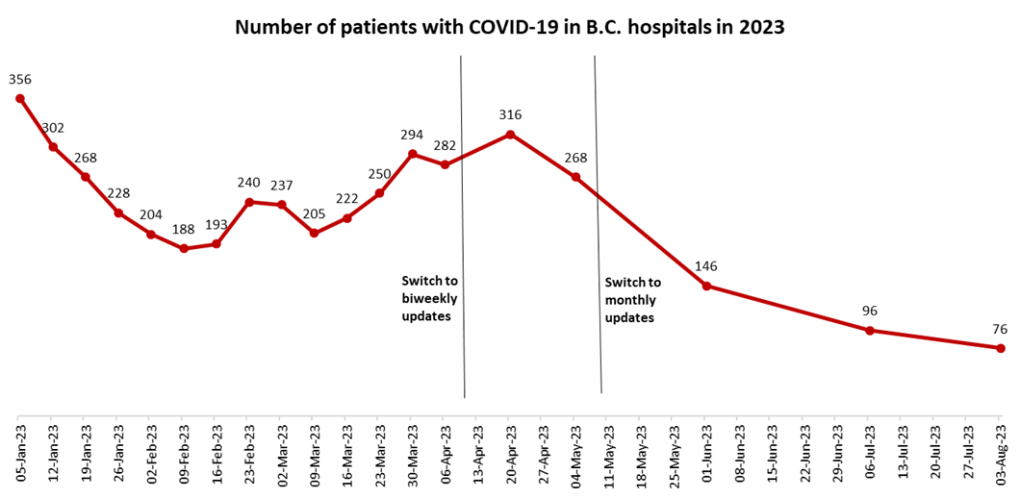Here's why a national institute reports thousands more COVID-19 hospitalizations in B.C. than local officials
 The exterior of the B.C. Centre for Disease Control office in Vancouver is seen in this photo from the centre's website. (bccdc.ca)
The exterior of the B.C. Centre for Disease Control office in Vancouver is seen in this photo from the centre's website. (bccdc.ca)
Did COVID-19 hospitalizations in B.C. increase or decrease last year? The answer, it turns out, depends on who you ask and how they're counting.
The Canadian Institute for Health Information says there were more COVID-19 hospitalizations in the 12 months from April 2022 through March 2023 than there were in the 12 months preceding that period, both in B.C. and Canada-wide.
The B.C. Centre for Disease Control says the opposite. Its data shows fewer hospitalizations in 2022-23 than in 2021-22.
They can't both be right, so what's going on here?
WHAT THE DATA SAYS
CIHI released data last week showing more than 120,000 hospital stays for COVID-19 from April 2022 through March 2023. That total is for all of Canada except Quebec, and it's almost a 20-per-cent increase in hospitalizations compared to the roughly 101,000 recorded from April 2021 through March 2022.
In British Columbia, CIHI reports a total of 18,199 hospitalizations for the most recent April through March period, up roughly 7 per cent from the 16,939 it reported for April 2021 through March 2022.
The BCCDC, on the other hand, says hospitalizations in the province decreased from one year to the other.
The BCCDC's online data portal shows 15,018 hospital admissions for the 2021-22 period, decreasing to 14,437 for 2022-23.
All of this is separate from how many people are currently in B.C. hospitals with COVID-19, which CTV News has been tracking since the start of the pandemic. That number comes from the BCCDC, and is now released monthly, though it used to be shared more frequently.
The BCCDC released its most recent count on Aug. 3, showing just 76 people in hospital with COVID-19 on that date. That was the lowest total in roughly two years, and the metric has shown a consistent downward trend for most of 2023, so far.
 The number of people in hospital with COVID-19 in 2023, as reported by the BCCDC, is shown. (CTV)
The number of people in hospital with COVID-19 in 2023, as reported by the BCCDC, is shown. (CTV)
Recent wastewater surveillance data, it should be noted, suggests increasing coronavirus transmission in the province, making a continued decline in the hospital census unlikely when the BCCDC releases its September update next week.
WHY ARE THE TWO DATA SOURCES SO DIFFERENT?
To a certain extent, CIHI and the BCCDC are measuring two different things. Though both agencies are counting hospitalizations, they're recording their findings at different points in the process.
The BCCDC's data is described as "hospital admissions," and the criteria for what is included has changed over the years.
Between April 1, 2022, and April 22 of this year, the definition was limited to "a first positive lab test," meaning reinfections were not included in the count. Anyone who tested positive on a lab-based PCR test for the first time and was hospitalized within 14 days was counted, as was anyone identified by a hospital as a COVID-19 patient based on a positive lab test, regardless of how long it had been since the test.
CIHI's data was collected through the Discharge Abstract Database, which "contains administrative, clinical and demographic information on hospital discharges" for all provinces except Quebec, according to CIHI data tables.
Nicole Loreti, program lead with CIHI's clinical administrative databases team, told CTV News her agency's data aims to include "anybody who was discharged during (the time in question) that had a documented case of COVID-19, whether that's confirmed or suspected."
Loreti noted a couple of key differences between CIHI's approach and the BCCDC's, which could help explain the discrepancy between the agencies' numbers.
First, she said CIHI's definition of a COVID case includes both lab-based and rapid antigen tests, the latter of which are not counted in B.C.'s data.
"Another difference is the admissions versus discharges," Loreti said. "If you're admitted in March but discharged in April, that hospital data doesn't flow to CIHI until April."
Those factors, as well as B.C.'s exclusion of reinfections, likely contribute to the disparity between the two agencies' numbers, but it's unclear whether they account for the entirety of the gulf.
Asked to weigh in on the differences between the two systems, the BCCDC provided a written statement that mentioned some of the same factors, while also emphasizing that each data set serves a different purpose.
"CIHI and BCCDC use different data sources for COVID-19 hospitalization numbers and count hospitalizations differently, so the two numbers are not directly comparable," the BCCDC said.
"The aim of BCCDC’s system is surveillance. It is to have information available rapidly to assess trends and inform provincial decision-making and action. Specifically, we are interested in capturing broad trends and changes in the population."
The purpose of the CIHI data, meanwhile, is to "assess health-care system impact," according to the BCCDC.
"Additional data from rapid antigen tests, hospital transfers, and readmissions are incorporated in their counts and reports," the centre said. "BCCDC does not use these data sources as they’re less reliable when needing them for timelier, more frequent reporting."
SO WHOSE DATA IS CORRECT?
Neither CIHI nor the BCCDC claimed that the other agency's data was wrong, and each one told CTV News the other's data served a valuable purpose.
However, the BCCDC's statement did seem to acknowledge that CIHI's numbers are more complete than its own.
"The BCCDC approach incorporates fewer data elements than CIHI, and the CIHI data are therefore more applicable to assessing the impact of COVID-19 on the health-care system," the provincial agency said.
But while CIHI's data adds thoroughness, it lacks timeliness. The agency publishes reports on COVID-19 data every six months, and its initial reports are typically missing data from Quebec, which is added later.
The BCCDC, by contrast, says it monitors hospital admissions in "nearly real time" to achieve the aforementioned goals of picking up on trends and informing provincial decision-making.
"The aims of these systems differ as they are attempting to answer different questions, which is why they’re not directly comparable," the BCCDC said. "However, together they strengthen our understanding of the burden of disease on population health."
CTVNews.ca Top Stories

LIVE UPDATES Police found fake IDs, 'ghost gun' and silencer on Luigi Mangione
Luigi Mangione was arrested in Altoona, Penn., after he was spotted at a McDonald’s, authorities say. The suspect was born and raised in Maryland and graduated from Ivy League University of Pennsylvania.
BREAKING Union reportedly drops wage demands in Canada Post negotiations
The Canadian Union of Postal Workers (CUPW) has reportedly dropped its wage demand to 19 per cent over four years, CTV News has learned.
Liberal government survives third Conservative non-confidence vote
Conservative Leader Pierre Poilievre's latest attempt to topple the minority Liberal government in a non-confidence vote failed on Monday, thanks to the New Democrats.
Sudbury, Ont., family traumatized after hospital said loved one had been released, when in fact they had passed away
Sudbury resident Angela Vitiello says a staff member at Health Sciences North told her that her brother, Allan St. Martin, was released from the hospital late last month when, in fact, he had passed away.
Montreal man retiring early after winning half of the $80 million Lotto-Max jackpot
Factor worker Jean Lamontagne, 63, will retire earlier than planned after he won $40 million on Dec. 3 in the Lotto-Max draw.
Trudeau says dealing with Trump will be 'a little more challenging' than last time
Prime Minister Justin Trudeau said dealing with incoming president Donald Trump and his thundering on trade will be 'a little more challenging' than the last time.
Katie Holmes refutes story about daughter Suri Cruise’s fortune
Katie Holmes has posted a screen grab of a Daily Mail article, which reported that her 18-year old daughter, whose father is Tom Cruise, is now a "millionaire."
Rupert Murdoch fails in bid to change family trust, New York Times reports
A Nevada commissioner has ruled against Rupert Murdoch's bid to change his family trust to consolidate control of his media empire in the hands of his son Lachlan, the New York Times reported on Monday.
Family spokesman says slain Edmonton security guard had only been working 3 days
A spokesman for the family of a security guard who police say was murdered while patrolling an Edmonton apartment building last week says the man had only been on the job for three days.
































